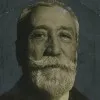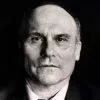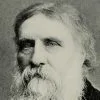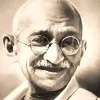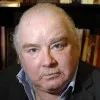ORESTES: I’ll go. I’ll start to do this dreadful thing, this horror. Yes, I will. If it’s the gods’ will, I’ll do it. But I take no joy in it.
[ὈΡΈΣΤΗΣ: ἔσειμι: δεινοῦ δ᾽ ἄρχομαι προβλήματος
καὶ δεινὰ δράσω γε — εἰ θεοῖς δοκεῖ τάδε,
ἔστω: πικρὸν δὲ χἡδὺ τἀγώνισμά μοι.]Euripides (485?-406? BC) Greek tragic dramatist
Electra [Ἠλέκτρα], l. 985ff (c. 420 BC) [tr. Wilson (2016)]
(Source)
Orestes going to kill his mother, Clytemnestra, who was, along with the already-killed Aegisthus, the murderer of his father, Agamemnon.
Interestingly, earlier translations have him characterize the task as both bitter and sweet; later ones only speak of its bitterness.
(Source (Greek)). Alternate translations:I go in.
Tho' I am entering on a deed that's fraught
With horror, I will execute the deed;
Thus let it be, if thus the righteous Gods
Ordain: altho' this conflict to my soul
At the same time be bitter, and yet sweet.
[tr. Wodhull (1809)]I will go in; it is a dreadful task I am beginning and I will do dreadful things. If the gods approve, let it be; to me the contest is bitter and also sweet.
[tr. Coleridge (1891)]I will enter in; but I am beginning a dreadful attempt. Ay, and I shall do dreadful things; but if this seems fit to the Gods, let it be; but the contest is for me [at once] bitter and sweet.
[tr. Buckley (1892)]I will go in. A horror I essay!
Yea, horrors will achieve! If this please Heaven,
So be it. Bitter strife, yet sweet, for me.
[tr. Way (1896)]Aye. So be it. -- I have ta'en
A path of many terrors: and shall do
Deeds horrible. 'Tis God will have it so. ...
Is this the joy of battle, or wild woe?
[tr. Murray (1905)]I will go in; 'tis an awful task I undertake; an awful deed I have to do; still if it is Heaven's will, be it so; I loathe and yet I love the enterprise.
[tr. Coleridge (1938 ed.)]Fine. I am going inside. Terrible the deed I shall begin and frightening the deeds I shall accomplish. If this is liked by the gods then so be it. My battle is bitter, not sweet.
[tr. Theodoridis (2006)]I’ll go in.
I’m on the verge of a horrendous act,
something truly dreadful. Well, so be it,
if gods approve of this. And yet, for me
the contest is not sweet at all, but bitter.
[tr. Johnston (2009)]
Quotations about:
terror
Note not all quotations have been tagged, so Search may find additional quotes on this topic.
It is the certainty that they possess the truth that makes men cruel.
[C’est la certitude qu’ils tiennent la vérité qui rend les hommes cruels.]
Anatole France (1844-1924) French poet, journalist, novelist, Nobel Laureate [pseud. of Jaques-Anatole-François Thibault]
(Misquotation)
Widely attributed (in French and English) to Anatole France, but not found in his works, including the one location it is sometimes cited from, Les Dieux Ont Soif [The Gods Are Thirsty, The Gods Are Athirst, The Gods Will Have Blood] (1912), in either English translation or, more importantly, in the original French.
While thematically keeping in the novel's depiction of the French Revolution and the Terror, the closest match to the quote I can find is this portion of ch. 22, talking about the expediting of the trials of those charged with counter-revolutionary crimes, eliminating the need to prove a misdeed by simply inquiring as to the accused's beliefs.Justice thus abbreviated satisfied them; the pace was quickened, and no obstacles were left to fret them. They limited themselves to an inquiry into the opinions of the accused, not conceiving it possible that anyone could think differently from themselves except in pure perversity. Believing themselves the exclusive possessors of truth, wisdom, the quintessence of good, they attributed to their opponents noting but error and evil. They felt themselves all-powerful; they envisaged God.
[tr. Allinson (1913), Jackson (1921)]Justice, thus curtailed, satisfied them; the pace was quickened and no obstacles were left to confuse them. They confined themselves to inquiring into the opinions of the accused, not conceiving it possible that anyone, except from pure perversity, could think differently from themselves. Believing themselves to possess a monopoly of truth, wisdom and goodness, they attributed to their opponents all error, stupidity and evil. They felt themselves omnipotent: their eyes had seen God.
[tr. Davies (1979)]La justice abrégée les contentait. Rien, dans sa marche accélérée, ne les troublait plus. Ils s’enquéraient seulement des opinions des accusés, ne concevant pas qu’on pût sans méchanceté penser autrement qu’eux. Comme ils croyaient posséder la vérité, la sagesse, le souverain bien, ils attribuaient à leurs adversaires l’erreur et le mal. Ils se sentaient forts : ils voyaient Dieu.
[Original]
Do not ask, Reader, how my blood ran cold
and my voice choked up with fear. I cannot write it:
this is a terror that cannot be told.
I did not die, and yet I lost life’s breath:
imagine for yourself what I became,
deprived at once of both my life and death.[Com’io divenni allor gelato e fioco,
nol dimandar, lettor, ch’i’ non lo scrivo,
però ch’ogne parlar sarebbe poco.
Io non mori’ e non rimasi vivo;
pensa oggimai per te, s’ hai fior d’ingegno,
qual io divenni, d’uno e d’altro privo.]Dante Alighieri (1265-1321) Italian poet
The Divine Comedy [Divina Commedia], Book 1 “Inferno,” Canto 34, l. 22ff (34.22-27) (1309) [tr. Ciardi (1954)]
(Source)
Dante the Pilgrim finally sees Satan at the bottom and center of Hell. That would seem to be terrifying enough for this aside to the reader, but various translators and commentators try to cast it as some great theological metaphor.
(Source (Italian)). Alternate translations:How frozen I was then, and hoarse with cold,
Reader, ask not; for I nought of it write,
As 'twill too little prove, whate'er I say
I did not die, nor yet alive remain'd.
Think for yourself, if you have any sense,
What I then was, depriv'd of Life and Death.
[tr. Rogers (1782)]While nature thro' my nerves convulsive shook:
New palsies seiz'd my agonizing frame,
And glowing now I felt the fever's flame.
While life and death by turns my limbs forsook.
[tr. Boyd (1802), st. 6]How frozen and how faint I then became,
Ask me not, reader! for I write it not,
Since words would fail to tell thee of my state.
I was not dead nor living. Think thyself
If quick conception work in thee at all,
How I did feel.
[tr. Cary (1814)]Ask me not, reader, how both hoarse and cold
I then became; I write it not, nor strive
To tell what never might by speech be told.
There I nor died, nor yet remained alive:
Now think, if thou hast power of thought, and see
What state was mine, that could of both deprive.
[tr. Dayman (1843)]How icy chill and hoarse I then became, ask not, O Reader! for I write it not, because all speech would fail to tell.
I did not die, and did not remain alive: now think for thyself, if thou hast an grain of ingenuity, what I became, deprived of both death and life.
[tr. Carlyle (1849)]How freezing then, how feeble I became,
Ask not, thou reader! for I cannot write;
For every language must fall short in flight.
I neither died, nor yet remained alive!
Think within thyself, if ingenious deft,
How I became of strength and heat bereft.
[tr. Bannerman (1850)]How terror-frozen I became and faint,
Ask not, oh reader, what I cannot write,
For all that I could say would feeble seem.
I did not die, I scarcely was alive;
Hast thou one spark of fancy, think thou then
How I became who knew nor death nor life.
[tr. Johnston (1867)]How frozen I became and powerless then,
Ask it not, Reader, for I write it not,
Because all language would be insufficient.
I did not die, and I alive remained not;
Think for thyself now, hast thou aught of wit,
What I became, being of both deprived.
[tr. Longfellow (1867)]How I then became frozen and weak, do not ask, reader, for I do not write it, seeing that every speech would be too little. I did not die and did not remain alive; think now for thyself, if thou hast a grain of wit, what I became, being deprived of one and the other.
[tr. Butler (1885)]How frozen I became, and weak of grace,
From writing, reader, let me now be shrived,
For every speech were weak such state to trace.
I did not die, and yet no longer lived;
Think for thyself, if thou hast Fancy's bloom,
What I became, of death and life deprived.
[tr. Minchin (1885)]How I became then chilled and hoarse, ask it not, Reader, for I write it not, because all speech would be little. I did not die, and I did not remain alive. Think now for thyself, if thou hast grain of wit, what I became, deprived of one and the other.
[tr. Norton (1892)]How frozen I became thereat, how fainting,
Ask it not, reader, for I do not write it.
For all that I could say would be but little.
I did not die, nor yet remained I living.
Bethink thee now, if aught of wit thou claimest,
What I became, bereft of both together.
[tr. Griffith (1908)]How chilled and faint I turned then, do not ask, reader, for I do not write it, since all words would fail. I did not die and I did not remain alive; think now for thyself, if thou hast any wit, what I became, denied both death and life.
[tr. Sinclair (1939)]How faint I then became, how frozen cold,
Ask me not, Reader; for I write it not,
Because all speech would fail, whate'er it told.
I died not, yet of life remained no jot.
Think thou then, if of wit thou hast any share,
What I became, deprived of either lot.
[tr. Binyon (1943)]How cold I grew, how faint with fearfulness,
Ask me not. Reader; I shall nor waste breath
Telling what words are powerless to express;
This was not life, and yet it was not death;
If thou hast wit to think how I might fare
Bereft of both, let fancy aid thy faith.
[tr. Sayers (1949)]How frozen and faint I then became, ask it not, reader, for I do not write it, because all words would fail. I did not die and I did not remain alive: now think for yourself, if you have any wit, what I became, deprived alike of death and life!
[tr. Singleton (1970)]How chilled and nerveless. Reader, I felt then;
do not ask me -- I cannot write about it --
there are no words to tell you how I felt.
I did not die -- I was not living either!
Try to imagine, if you can imagine,
me there, deprived of life and death at once.
[tr. Musa (1971)]O reader, do not ask of me how I
grew faint and frozen then -- I cannot write it:
all words would fall far short of what it was.
I did not die, and I was not alive; v think for yourself, if you have any wit,
what I became, deprived of life and death.
[tr. Mandelbaum (1980)]How frozen and how faint I then became,
Do not enquire, reader, description is useless,
For any speech would be inadequate.
I did not die, nor yet remain alive:
Think for yourself, if you have a trace
Of intellect, how I was, in that condition.
[tr. Sisson (1981)]How chilled and faint I was
On hearing that, you must not ask me, reader --
I do not write it, words would not suffice:
I neither died, nor kept alive -- consider
With your own wits what I, alike denuded
Of death and life, became as I heard my leader.
[tr. Pinsky (1994)]How then I became frozen and feeble, do not ask, reader, for I do not write it, and all speech would be insufficient.
I did not die and I did not remain alive: think now for yourself, if you have wit at all, what I became, deprived of both.
[tr. Durling (1996)]Reader, do not ask how chilled and hoarse I became, then, since I do not write it, since all words would fail to tell it. I did not die, yet I was not alive. Think, yourself, now, if you have any grain of imagination, what I became, deprived of either state.
[tr. Kline (2002)]How weak I now became, how faded, dry --
reader, don’t ask, I shall not write it down --
for anything I said would fall far short.
I neither died nor wholly stayed alive.
Just think yourselves, if your minds are in flower,
what I became, bereft of life and death.
[tr. Kirkpatrick (2006)]Then how faint and frozen I became,
reader, do not ask, for I do not write it,
since any words would fail to be enough.
It was not death, nor could one call it life.
Imagine, if you have the wit,
what I became, deprived of either state.
[tr. Hollander/Hollander (2007)]Don't ask me, reader, how frozen and faint I felt:
I cannot write it, because no matter what words
I used, or how many, none would be sufficient.
I did not die, I did not remain in that world.
Just ask yourself, if you have a mind to work with,
In what condition I was, not dead, not alive?
[tr. Raffel (2010)]Reader, don’t ask how chill and faint I turned:
I couldn't write it. All the words would fail.
I didn't die, but couldn't live. I learned
What living death and death-in-life entail.
But you must ponder, if you have the wit,
What I, denied both life and death, became.
[tr. James (2013), l. 28ff]
He shall come to know
Dionysus, son of Zeus, consummate god,
most terrible, and yet most gentle, to mankind.[γνώσεται δὲ τὸν Διὸς
Διόνυσον, ὃς πέφυκεν ἐν τέλει θεός,
δεινότατος, ἀνθρώποισι δ᾽ ἠπιώτατος.]Euripides (485?-406? BC) Greek tragic dramatist
Bacchæ [Βάκχαι], l. 859ff [Dionysus/Διόνυσος] (405 BC) [tr. Arrowsmith (1960)]
(Source)
Speaking of King Pentheus. (Source (Greek)). Alternate translations:Thus he shall know dread Bacchus, son of Jove,
A god most terrible when he asserts
His slighted power: but gracious to mankind.
[tr. Wodhull (1809)]He will recognize the son of Zeus, Dionysus, who is in fact a god, the most terrible and yet most mild to men.
[tr. Buckley (1850)]Know he must
Dionysus, son of Jove, among the gods
Mightiest, yet mildest to the sons of men.
[tr. Milman (1865)]There belike to tell
That Dionysus, son to Zeus, is god,
Most terrible, most gracious unto men.
[tr. Rogers (1872), l. 820ff]So shall he recognize Dionysus, the son of Zeus, who proves himself at last a god most terrible, for all his gentleness to man.
[tr. Coleridge (1891)]And he shall know Zeus' son
Dionysus, who hath risen at last a God
Most terrible, yet kindest unto men.
[tr. Way (1898)]So shall he learn and mark
God's true Son, Dionyse, in fulness God,
Most fearful, yet to man most soft of mood.
[tr. Murray (1902)]And he shall recognize the son of Zeus,
Dionysus, as a god in perfect essence:
a terrible one, but to men most gentle.
[tr. Kirk (1970)]And he shall know the son of Zeus, Dionysus; who, those most gentle to mankind, can prove a god of terror irresistible.
[tr. Vellacott (1973)]Consummate god, most terrible, most gentle
To mankind.
[tr. Soyinka (1973), Bacchante speaking]He shall know Zeus’ son
Dionysos, that he is in his fullness a god
most dreadful, and to men most mild.
[tr. Neuburg (1988)]So shall Pentheus come to know Dionysus, son of Zeus,
a God sprung from nature, like nature most cruel,
and, yet, most gentle to mankind.
[tr. Cacoyannis (1982)]And he'll know
Zeus-born Dionysos is a true divinity,
Most terrifying to men, and most kind.
[tr. Blessington (1993)]He will come to know Dionysus, the son of Zeus,
that he is, in the ritual of initiation, a god most terrifying,
but for mankind a god most gentle.
[tr. Esposito (1998)]Then he will know the son of Zeus,
Dionysus, and realize that he was born a god, bringing
terrors for initiation, and to the people, gentle grace.
[tr. Woodruff (1999)]And he will know that Dionysos, son
Of Zeus, was born a god in full, and is
Most terrible to mortals and most gentle.
[tr. Gibbons/Segal (2000)]He will learn that Dionysus is in the full sense a god, a god most dreadful to morals -- but also most gentle!
[tr. Kovacs (2002)]He'll learn the nature of this son of Zeus:
The sweetest and most fearsome of the gods.
[tr. Teevan (2002)]Only then will he learn that the son of Zeus, Dionysos, is a god of peace for the good folk but he is also a fearsome god who those who don’t respect him.
[tr. Theodoridis (2005)]He will recognize Zeus' son Dionysus, born in ritual,
The most terrible god -- and kindest to humans.
[tr. Valerie (2005)]He'll come to acknowledge
Dionysus, son of Zeus, born in full divinity,
most fearful, yet most kind to human beings.
[tr. Johnston (2008)]And he shall finally know Dionysus, son of Zeus,
a god both terrible and gentle to the world of man.
[tr. Robertson (2014)]He will know Dionysus. He will know the son of Zeus to be true-god-born, to be the greatest horror to mortal kind.
And the greatest helper.
[tr. Pauly (2019)]He shall learn that Dionysus is the son of Zeuis, a god with the power of a god, a god most fearful and most gentle.
[tr. Behr/Foster (2019)]And he will come to know the son of Zeus,
Dionysus, the one who is by his own nature a god in the end [telos],
the one who is most terrifying [deinos], but, for humans, also most gentle [ēpios ].
[tr. Buckley/Sens/Nagy (2020)]
The Fear of Death often proves Mortal, and sets People on Methods to save their Lives, which infallibly destroy them.
Joseph Addison (1672-1719) English essayist, poet, statesman
Essay (1711-03-24), The Spectator, No. 25
(Source)
In the throat
Of Hell, before the very vestibule
Of opening Orcus, sit Remorse and Grief,
And pale Disease, and sad Old Age, and Fear,
And Hunger that persuades to crime, and Want,
Forms terrible to see. Suffering and Death
Inhabit here, and Death’s own brother, Sleep;
And the mind’s evil Lusts, and deadly War
Lie at the threshold, and the iron beds
Of the Eumenides; and Discord wild,
Her viper-locks with bloody fillets bound.[Vestibulum ante ipsum, primisque in faucibus Orci
Luctus et ultrices posuere cubilia Curae;
pallentesque habitant Morbi, tristisque Senectus,
et Metus, et malesuada Fames, ac turpis Egestas,
terribiles visu formae: Letumque, Labosque;
tum consanguineus Leti Sopor, et mala mentis
Gaudia, mortiferumque adverso in limine Bellum,
ferreique Eumenidum thalami, et Discordia demens,
vipereum crinem vittis innexa cruentis.]Virgil (70-19 BC) Roman poet [b. Publius Vergilius Maro; also Vergil]
The Aeneid [Ænē̆is], Book 6, l. 274ff (6.274-282) (29-19 BC) [tr. Cranch (1872), l. 336ff]
(Source)
The gates of the Underworld, as Aeneas enters.
(Source (Latin)). Alternate translations:Just at the door, before the gates of hell,
Sorrow repos'd, with her revenging Rage,
Pale sicknesses and discontented age,
Fear, with dire Famine, and base Povertie,
Labour and death, shapes terrible to see.
Then sleep allied to Death, and fond joys are
Plac'd on the other side, with deadly War,
On iron beds, Furies and Discord sit,
Their viperous hair with bloody fillets knit.
[tr. Ogilby (1649)]Just in the gate and in the jaws of hell,
Revengeful Cares and sullen Sorrows dwell,
And pale Diseases, and repining Age,
Want, Fear, and Famine's unresisted rage;
Here Toils, and Death, and Death's half-brother, Sleep,
Forms terrible to view, their sentry keep;
With anxious Pleasures of a guilty mind,
Deep Frauds before, and open Force behind;
The Furies' iron beds; and Strife, that shakes
Her hissing tresses and unfolds her snakes.
[tr. Dryden (1697)]Before the vestibule itself, and in the first jaws of hell, Grief and vengeful Cares have placed their couches, and pale Diseases dwell, and disconsolate Old Age, and Fear, and the evil counsellor Famine, and vile deformed Indigence, forms ghastly to the sight! and Death, and Toil; then Sleep, akin to Death, and criminal Joys of the mind; and in the opposite threshold murderous War, and the iron bed-chambers of the Furies, and frantic Discord, having her viperous locks bound with bloody fillets.
[tr. Davidson/Buckley (1854)]At Orcus' portals hold their lair
Wild Sorrow and avenging Care;
And pale Diseases cluster there,
And pleasureless Decay,
Foul Penury, and Fears that kill,
And Hunger, counsellor of ill,
A ghastly presence they:
Suffering and Death the threshold keep,
And with them Death's blood-brother, Sleep:
Ill Joys with their seducing spells
And deadly War are at the door;
The Furies couch in iron cells,
And Discord maddens and rebels;
Her snake-locks hiss, her wreaths drip gore.
[tr. Conington (1866)]Right in front of the doorway and in the entry of the jaws of hell Grief and avenging Cares have made their bed; there dwell wan Sicknesses and gloomy Eld, and Fear, and ill-counselling Hunger, and loathly Want, shapes terrible to see; and Death and Travail, and thereby Sleep, Death's kinsman, and the Soul's guilty Joys, and death-dealing War full in the gateway, and the Furies in their iron cells, and mad Discord with bloodstained fillets enwreathing her serpent locks.
[tr. Mackail (1885)]Lo, in the first of Orcus' jaws, close to the doorway side,
The Sorrows and Avenging Griefs have set their beds to bide;
There the pale kin of Sickness dwells, and Eld, the woeful thing,
And Fear, and squalid-fashioned Lack, and witless Hungering,
Shapes terrible to see with eye; and Toil of Men, and Death,
And Sleep, Death's brother, and the Lust of Soul that sickeneth:
And War, the death-bearer, was set full in the threshold's way,
And those Well-willers' iron beds: there heartless Discord lay,
Whose viper-breeding hair about was bloody-filleted.
[tr. Morris (1900), l. 272ff]Before the threshold, in the jaws of Hell,
Grief spreads her pillow, with remorseful Care.
There sad Old Age and pale Diseases dwell,
And misconceiving Famine, Want and Fear,
Terrific shapes, and Death and Toil appear.
Death's kinsman, Sleep, and Joys of sinful kind,
And deadly War crouch opposite, and here
The Furies' iron chamber, Discord blind
And Strife, her viperous locks with gory fillets twined.
[tr. Taylor (1907), st. 38, l. 334]In the first courts and entrances of Hell
Sorrows and vengeful Cares on couches lie:
There sad Old Age abides, Diseases pale,
And Fear, and Hunger, temptress to all crime;
Want, base and vile, and, two dread shapes to see,
Bondage and Death : then Sleep, Death's next of kin;
And dreams of guilty joy. Death-dealing War
Is ever at the doors, and hard thereby
The Furies' beds of steel, where wild-eyed Strife
Her snaky hair with blood-stained fillet binds.
[tr. Williams (1910)]Just before the entrance, even within the very jaws of Hell, Grief and avenging Cares have made their bed; there pale Diseases dwell, and sad Age, and Fear, and ill-counselling Famine, and loathly Want, shapes terrible to view; and Death and Distress; next, Death's own brother Sleep, and the soul's Guilty Joys, and, on the threshold opposite, the death-bearer War, and the Furies' iron cells, and savage Strife, her snaky locks entwined with bloody fillets.
[tr. Fairclough (1916)]At the first threshold, on the jaws of Orcus,
Grief and avenging Cares have set their couches,
And pale Diseases dwell, and sad Old Age,
Fear, evil-counselling Hunger, wretched Need,
Forms terrible to see, and Death, and Toil,
And Death’s own brother, Sleep, and evil Joys,
Fantasies of the mind, and deadly War,
The Furies’ iron chambers, Discord, raving,
Her snaky hair entwined in bloody bands.
[tr. Humphries (1951)]See! At the very porch and entrance way to Orcus
Grief and ever-haunting Anxiety make their bed:
Here dwell pallid Diseases, here morose Old Age,
With Fear, ill-prompting Hunger, and squalid Indigence,
Shapes horrible to look at, Death and Agony;
Sleep, too, which is the cousin of Death; and Guilty Joys,
And there, against the threshold, War, the bringer of Death:
Here are the iron cells of the Furies, and lunatic Strife
Whose viperine hair is caught up with a headband soaked in blood.
[tr. Day-Lewis (1952)]Before the entrance, at the jaws of Orcus,
both Grief and goading Cares have set their couches;
there pale Diseases dwell, and sad Old Age,
and Fear and Hunger, that worst counselor,
and ugly Poverty -- shapes terrible
to see -- and Death and Trials; Death's brother, Sleep,
and all the evil Pleasures of the mind;
and War, whose fruits are death; and facing these,
the Furies' iron chambers; and mad Strife,
her serpent hair bound up with bloody garlands.
[tr. Mandelbaum (1971), l. 363ff]Before the entrance, in the jaws of Orcus,
Grief and avenging Cares have made their beds,
And pale Diseases and sad Age are there,
And Dread, and Hunger that sways men to crime,
And sordid Want -- in shapes to affright the eyes --
And Death and Toil and Deaths;s own brother, Sleep,
And the mind's evil joys; on the door sill
Death-bringing War, and iron cubicles
Of the Eumenidës, and raving Discord,
Viperish hair bound up in gory bands.
[tr. Fitzgerald (1981)]Before the entrance hall of Orcus, in the very throat of hell, Grief and Revenge have made their beds and Old age lives there in despair, with white faced Diseases and Fear and Hunger, corrupter of men, and squalid Poverty, things dreadful to look upon, and Death and Drudgery besides. Then there were Sleep, Death's sister, perverted Pleasures, murderous War astride the threshold, the iron chambers of the Furies and raving Discord with blood-soaked ribbons binding her viperous hair.
[tr. West (1990)]Right before the entrance, in the very jaws of Orcus,
Grief and vengeful Care have made their beds,
and pallid Sickness lives there, and sad Old Age,
and Fear, and persuasive Hunger, and vile Need,
forms terrible to look on, and Death and Pain:
then Death’s brother Sleep, and Evil Pleasure of the mind,
and, on the threshold opposite, death-dealing War,
and the steel chambers of the Furies, and mad Discord,
her snaky hair entwined with blood-wet ribbons.
[tr. Kline (2002)]Just before the entrance, in the very jaws
Of Orcus, Grief and avenging Cares
Have set their beds. Pale Diseases
Dwell there, sad Old Age, Fear, Hunger --
The tempter -- and foul Poverty,
All fearful shapes, and Death and Toil,
And Death's brother Sleep, Guilty Joys,
And on the threshold opposite, lethal War,
The Furies in iron cells, and mad Strife,
Her snaky hair entwined with bloody bands.
[tr. Lombardo (2005)]There in the entryway, the gorge of hell itself,
Grief and the pangs of Conscience make their beds,
and fatal pale Disease lives there, and bleak Old Age,
Dread and Hunger, seductress to crime, and grinding Poverty,
all, terrible shapes to see -- and Death and deadly Struggle
and Sleep, twin brother of Death, and twisted, wicked Joys
and facing them at the threshold, War, rife with death,
and the Furies’ iron chambers, and mad, raging Strife
whose blood-stained headbands knot her snaky locks.
[tr. Fagles (2006), l. 312ff]At the entrance, in Orcus' very jaws, Grief and vengeful Sorrow made their beds, and Pale Diseases, sad Old Age, and Fear and ill-advising Hunger and shameful Poverty, forms horrible to see, and Death and Suffering, then Death's brother Slumber, and the Joys of evil men. Facing them were murderous War and the Furies' iron chambers and mad Discord, her serpent hair bound up with bloody ribbons.
[tr. Bartsch (2021)]
Aghast, astonish’d, and struck dumb with fear,
I stood; like bristles rose my stiffen’d hair.[Obstupui, steteruntque comae, et vox faucibus haesit.]
Virgil (70-19 BC) Roman poet [b. Publius Vergilius Maro; also Vergil]
The Aeneid [Ænē̆is], Book 2, l. 774ff (2.774) [Aeneas] (29-19 BC) [tr. Dryden (1697)]
(Source)
Confronting his wife's ghost. (Source (Latin)). Alternate translations:Amaz'd, struck dumb, erected was my hair.
[tr. Ogilby (1649)]I stood aghast! my hair rose on end, and my voice clung to my jaws.
[tr. Davidson/Buckley (1854)]I stood appall'd, my hair erect,
And fear my tongue-tied utterance checked.
[tr. Conington (1866)]Aghast I stood, with hair
Erect: my voice clung to my throat.
[tr. Cranch (1872), ll. 1041-42]I was motionless; my hair stood up, and the accents faltered on my tongue.
[tr. Mackail (1885)]I stood amazed, my hair rose up, nor from my jaws would pass
My frozen voice.
[tr. Morris (1900)]Aghast I stood, tongue-tied, with stiffening hair.
[tr. Taylor (1907), st. 104, l. 935]I quailed, my hair rose, and I gasped for fear.
[tr. Williams (1910)]I was appalled, my hair stood up, and the voice clave to my throat.
[tr. Fairclough (1916)]I was appalled: my hair stood on end, and my voice struck
In my throat.
[tr. Day Lewis (1952)]I was dismayed;
my hair stood stiff, my voice held fast within
my jaws.
[tr. Mandelbaum (1971), ll. 1043-45]Chilled to the marrow, could feel the hair
On my head rise, the voice clot in my throat.
[tr. Fitzgerald (1981), ll. 1004-5]I was paralyzed. My hair stood on end. My voice stuck in my throat.
[tr. West (1990)]I was dumbfounded, my hair stood on end, and my voice
stuck in my throat.
[tr. Kline (2002)]I was transfixed,
My hair stood on end, and my voice choked.
[tr. Lombardo (2005), ll. 913-14]I froze. My hackles bristled, voice choked in my throat.
[tr. Fagles (2006), l. 960]I was aghast. My hair stood up, my voice stuck in my throat.
[tr. Bartsch (2021)]
Terror,
Terror and silence were all I found.[Horror ubique animo, simul ipsa silentia terrent.]
Virgil (70-19 BC) Roman poet [b. Publius Vergilius Maro; also Vergil]
The Aeneid [Ænē̆is], Book 2, l. 755 (2.755) (29-19 BC) [tr. Humphries (1951)]
(Source)
Aeneas recounting searching fallen Troy for his lost wife. (Source (Latin)). Alternate translations:Horror each where, nay silence strikes a feare.
[tr. Ogilby (1649)]All things were full of horror and affright,
And dreadful even the silence of the night.
[tr. Dryden (1697)]Horror on all sides, and at the same time the very silence affrights my soul.
[tr. Davidson/Buckley (1854)]A shuddering on my spirit falls,
And e'en the silence' self appals.
[tr. Conington (1866)]Everywhere horror fills my soul, and even
The silence terrifies.
[tr. Cranch (1872)]Everywhere my spirit shudders, dismayed at the very silence.
[tr. Mackail (1885)]While on the heart lies weight of fear, and e'en the hush brings dread.
[tr. Morris (1900)]Horror waits
Around; the very silence breeds affright.
[tr. Taylor (1907), st. 102, ll. 912-13]On all sides round
horror spread wide; the very silence breathed
a terror on my soul.
[tr. Williams (1910)]Everywhere dread fills my heart; the very silence, too, dismays.
[tr. Fairclough (1916)]Everywhere
Dread and the sheer silence reduced my courage to nothing.
[tr. Day Lewis (1952)]My spirit is held by horror everywhere;
even the very silence terrifies.
[tr. Mandelbaum (1971), ll. 1017-18]And everywhere my heart misgave me: even
Stillness had its terror.
[tr. Fitzgerald (1981), ll. 983-84]Horror was everywhere and the very silence chilled the blood.
[tr. West (1990)]Everywhere the terror in my heart, and the silence itself,
dismay me.
[tr. Kline (2002)]Everywhere there was fear. The very silence
Was terrifying.
[tr. Lombardo (2005), ll. 890-91]With terror at every turn, the very silence makes me cringe.
[tr. Fagles (2006), l. 937]Horror filled me everywhere, the very silence scared me.
[tr. Bartsch (2021)]
“Darkness” is shorthand for anything that scares me — that I want no part of — either because I am sure that I do not have the resources to survive it or because I do not want to find out. The absence of God is in there, along with the fear of dementia and the loss of those nearest and dearest to me. So is the melting of polar ice caps, the suffering of children, and the nagging question of what it will feel like to die. If I had my way, I would eliminate everything from chronic back pain to the fear of the devil from my life and the lives of those I love — if I could just find the right night-lights to leave on.
At least I think I would. The problem is this: when, despite all my best efforts, the lights have gone off in my life (literally or figuratively, take your pick), plunging me into the kind of darkness that turns my knees to water, nonetheless I have not died. The monsters have not dragged me out of bed and taken me back to their lair. The witches have not turned me into a bat. Instead, I have learned things in the dark that I could never have learned in the light, things that have saved my life over and over again, so that there is really only one logical conclusion. I need darkness as much as I need light.Barbara Brown Taylor (b. 1951) American minister, academic, author
Learning to Walk in the Dark, Introduction (2014)
(Source)
How very little can be done under the spirit of fear; it is the very sentence pronounced upon the serpent, “Upon they belly shalt thou go all the days of thy life.”
Florence Nightingale (1820-1910) English social reformer, statistician, founder of modern nursing
Letter to Hannah Nicholson (May 1846)
(Source)
Despotic authority attaches great importance to being considered strong, and much less to being admired for its wisdom. Besides, what does wisdom mean to a despot? It means skill in the use of power. The wise despot knows when and how to strike. This continual display of power is necessary because, at root, any dictatorship appeals to the lowest instincts of the governed: fear, aggressiveness toward one’s neighbors, bootlicking. Terror most effectively excites such instincts, and fear of strength is the wellspring of terror.
Ryszard Kapuściński (1932-2007) Polish journalist, photographer, poet, author
Shah of Shahs (1982)
(Source)
It was foolish indeed — thus to run farther and farther from all who could help her, as if she had been seeking a fit spot for the goblin-creature to eat her in at his leisure; but that is the way fear serves us: it always sides with the thing we are afraid of.
George MacDonald (1824-1905) Scottish novelist, poet
The Princess and the Goblin, ch. 14 (1872)
(Source)
Pity is aroused by unmerited misfortune, fear by the misfortune of a man like ourselves.
[ἔλεος μὲν περὶ τὸν ἀνάξιον, φόβος δὲ περὶ τὸν ὅμοιον]
Aristotle (384-322 BC) Greek philosopher
Poetics [Περὶ ποιητικῆς, De Poetica], ch. 13 / 1453a (c. 335 BC) [tr. Butcher (1895)]
(Source)
On the essential elements of tragedy. Original Greek. Alternate translations:
- "Pity is occasioned by undeserved misfortune, and fear by that of one like ourselves." [tr. Bywater (1909)]
- "Pity is concerned with unmerited ill-fortune, fear with what happens to one's like." [tr. Margoliouth (1911)]
- "Pity for the undeserved misfortune, fear for the man like ourselves." [tr. Fyfe (1932)]
- "We pity those who suffer undeservedly, and feel fear for people who are like ourselves." [tr. Janko (1987)]
- "The one [pity] is to do with the man brought to disaster undeservedly, the other [terror] is to do with [what happens to] men like us." [tr. Whalley (1997)]
- "One of these sentiments, namely pity, has to do with undeserved misfortune, and the other, namely fear, has to do with someone who is like ourselves." [tr. Sachs (2006)]
Night poured over the desert. It came suddenly, in purple. In the clear air, the stars drilled down out of the sky, reminding any thoughtful watcher that it is in the deserts and high places that religions are generated. When men see nothing but bottomless infinity over their heads they have always had a driving and desperate urge to find someone to put in the way.
The splendor of the goal of the French Revolution is simultaneously the source of our strength and of our weakness: our strength, because it gives us an ascendancy of truth over falsehood, and of public rights over private interests; our weakness, because it rallies against us all vicious men, all those who in their hearts seek to despoil the people . … It is necessary to stifle the domestic and foreign enemies of the Republic or perish with them. Now in these circumstances, the first maxim of our politics ought to be to lead the people by means of reason and the enemies of the people by terror. If the basis of popular government in time of peace is virtue, the basis of popular government in time of revolution is both virtue and terror: virtue without which terror is murderous, terror without which virtue is powerless. Terror is nothing else than swift, severe, indomitable justice; it flows, then, from virtue.
Maximilien Robespierre (1758-174) French lawyer, politician, revolutionary leader
Speech, National Convention (7 May 1794)
(Source)
In a parallel thought, he wrote in On the Principles of Political Morality (1794):
If virtue be the spring of a popular government in times of peace, the spring of that government during a revolution is virtue combined with terror: virtue, without which terror is destructive; terror, without which virtue is impotent. Terror is only justice prompt, severe and inflexible; it is then an emanation of virtue; it is less a distinct principle than a natural consequence of the general principle of democracy, applied to the most pressing wants of the country.
The practice of terror serves the true believer not only to cow and crush his opponents but also to invigorate and intensify his own faith.
Eric Hoffer (1902-1983) American writer, philosopher, longshoreman
True Believer: Thoughts on the Nature of Mass Movements, Part 3, ch. 14, § 85 (1951)
(Source)
If you ever want to feel like you’re on the verge of total, abject bowel-releasing terror, try making your way a klick or two out of a forest, at night, with the certain feeling you’re being hunted. It makes you feel alive, it really does, but not in a way you want to feel alive.
If you can’t joke about the most horrendous things in the world, what’s the point of jokes? What’s the point in having humor? Humor is to get us over terrible things. That’s all it’s for. That’s why you should laugh at funerals. Of course it’s the wrong thing to say. That’s why it’s funny.
Ricky Gervais (b. 1961) English comedian, actor, director, writer
Interview with Chris Heath, GQ (15 May 2013)
(Source)
More to the point, nameless hideous monsters are freaking terrifying. You always fear what you don’t know, what you don’t understand, and the first step to having understanding of something is to know what to call it. It’s a habit of mine to give names to anything I wind up interacting with if it doesn’t have one readily available. Names have power — magically, sure, but far more important, they have psychological power. Something horrible with a name holds less power over you, less terror, than something horrible without one.
“Octokongs,” I pronounced grimly. “Why did it have to be octokongs?”
Somebody was screaming and I had to check it wasn’t me. It could have been me. I certainly wanted to scream, but I remembered that right then and there Leslie and I were the only coppers on the scene and the public doesn’t like it when the police start screaming; it contributes to an impression of things not being conducive to public calm.
There’s power in the night. There’s terror in the darkness. Despite all our accumulated history, learning, and experience, we remember. We remember times when we were too small to reach the light switch on the wall, and when the darkness itself was enough to make us cry out in fear. Get a good ways out from civilization — say, miles and miles away on a lightless lake — and the darkness is there, waiting. Twilight means more than just time to call the children in from playing outside. Fading light means more than just the end of another day. Night is when terrible things emerge from their sleep and seek soft flesh and hot blood. Night is when unseen beings with no regard for what our people have built and no place in what we have deemed the natural order look in at our world from outside, and think dark and alien thoughts. And sometimes, just sometimes, they do things.
Vows made in Storms are forgot in Calms.
Thomas Fuller (1654-1734) English physician, preacher, aphorist, writer
Gnomologia: Adages and Proverbs (compiler), # 5408 (1732)
(Source)
A Degree of Fear sharpeneth, the Excess of it stupifieth.
George Savile, Marquis of Halifax (1633-1695) English politician and essayist
“Fear,” Political, Moral and Miscellaneous Reflections (1750)
(Source)
Totalitarianism is never content to rule by external means, namely, through the state and a machinery of violence; thanks to its peculiar ideology and the role assigned to it in this apparatus of coercion, totalitarianism has discovered a means of dominating and terrorizing human beings from within.
Hannah Arendt (1906-1975) German-American philosopher, political theorist
The Origins of Totalitarianism, Part 3, ch. 10 “A Classless Society”, sec. 1 (1951)
(Source)
So, first of all, let me assert my firm belief that the only thing we have to fear is fear itself — nameless, unreasoning, unjustified terror which paralyzes needed efforts to convert retreat into advance.


